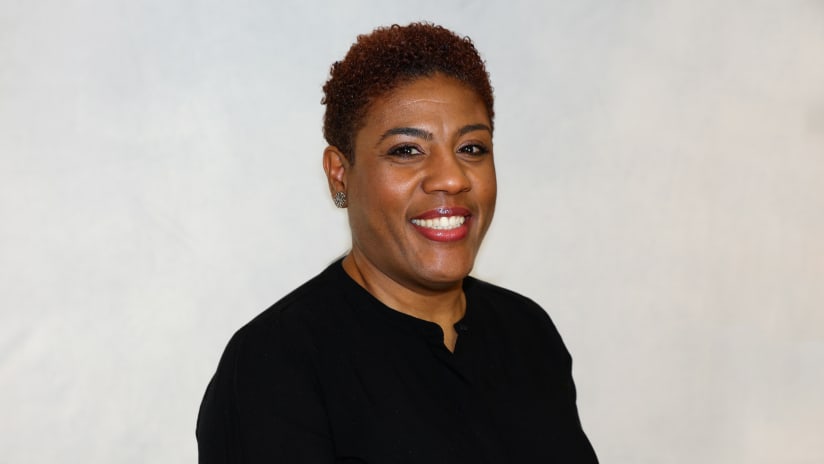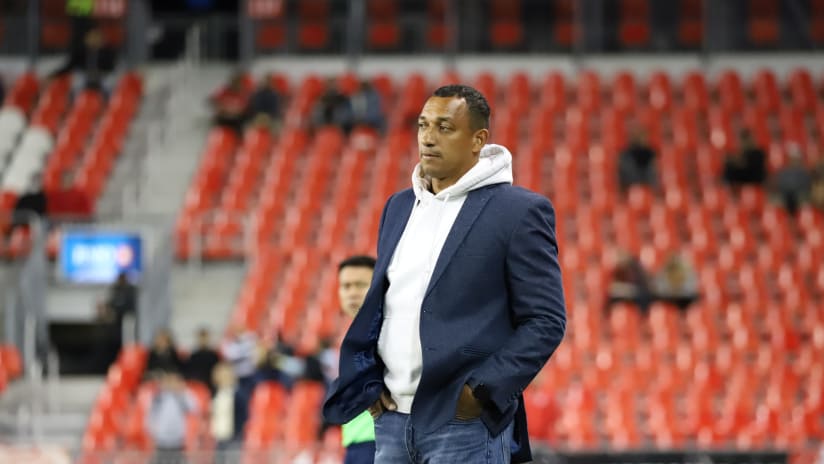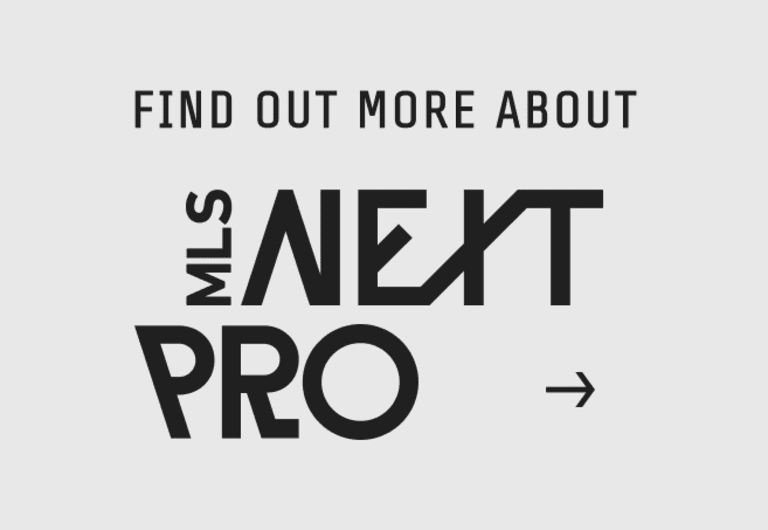"Grab the coffee cake" may not be typical advice, but they are wise words to live by.
MLS NEXT Pro's Vice President of Human Resources, Jovina Johnson, is far from typical. Born in the Bronx but raised in Farmville, Virginia, Jovina is one of the leaders at MLS NEXT Pro who joined the league before its inaugural season kick-off in 2022.
"People don't realize that grabbing the coffee cake is literally like the metaphorical golf (game invitation)." Johnson referenced this as part of the advice she gives young people today. "Play the game. Even if you don't drink, go to the happy hour." Johnson has played her fair share of the game, allowing her to excel in her career. Still, like is the case for many African-American women trying to move up the professional ranks, the road has not exactly been a walk in the park.
Black History Month allows many of us in this country to celebrate the accomplishments and contributions of African-American community members. At MLS NEXT Pro, we see the daily impact of the Black members who play vital roles in the organization. Johnson is part of that group.
MLSNEXTPro.com caught up with Jovina for a conversation that spanned stories about her upbringing and the challenges she faced on her way to her current role.
"I had a very strict upbringing by my grandmother, so my childhood was a little bit different," Jovina said, recalling her childhood in Farmville. When she was three years old, she left New York and was taken to South Central Virginia to be raised by her grandparents.
"She was a stricter woman. So, no dating, no hanging out with friends. None of that. Still, my childhood definitely wasn't horrible. But I wasn't doing extracurricular activities either."
Despite the strictness, Jovina appreciated the basic things, like always having food on the table. However, Johnson's grandmother's perception of society had much to do with her experience growing up during some of the most challenging times of the last century.
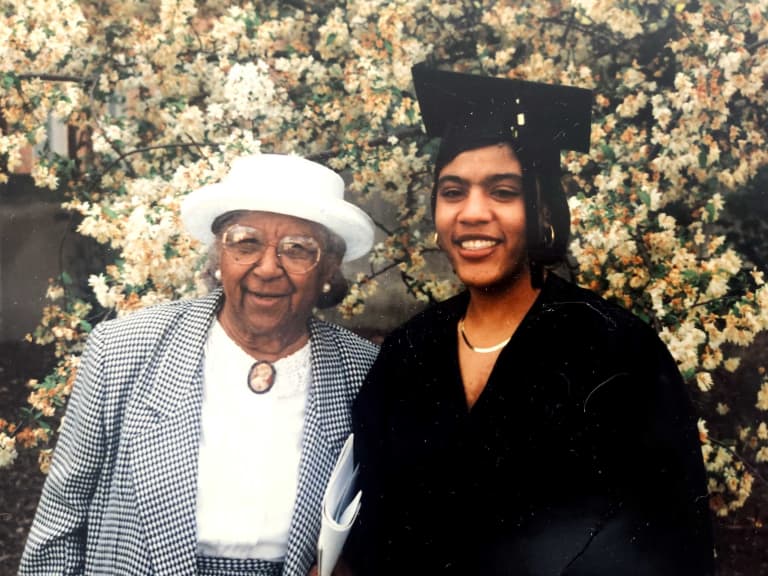
"Looking back on it now that I'm out in the (real) world and me being raised by a woman who grew up during the depression and during the civil rights movement, my upbringing was a little bit different. My grandmother viewed race differently than other (Black) people (not raised during that same era) might have viewed it. I didn't go to slumber parties. I didn't go places because if a white person invited me to a slumber party, my grandma was like 'They don't want you at their house. Don't go'".
For Johnson, the social issues plaguing the African-American community externally and internally did not stop her from wanting to educate herself. "In high school, I was that chick winning spelling bees and getting good grades. A lot of Black people said I wanted to be white, and it was a constant running joke. It was like 'Of course, Jovina did the homework. She wants to be white.'" Jovina did not want to be white. She just wanted to excel. Her good grades and determination ultimately landed her at Penn State, and she got an opportunity to blossom. Those were not the only reasons she chose to go there, though.
"It's in my dad's price range. If I had a little more pride in myself as a black person, I would have looked more into Historical Black Colleges and Universities (HBCUs). But my dad didn't like them, and he denies it to this day. But he told me, my sister, and my brother not to go to an HBCU. They're not as valued on a resume as a regular school." At the time, Jovina did not think much of it. Still, as she remembered her grandmother and father, she recalled, "Our goal was to make people that didn't look like us as comfortable in our presence as possible. That was one way to do that."
Johnson was grateful to have a college degree to help build a career. At the time of her college graduation, not many Black people were getting bachelor's degrees. According to the US Census Bureau, less than 14 percent of African-Americans had at least a bachelor's degree in the mid to late 1990s. "Getting college degrees wasn't as prevalent as it is now. The role of African-Americans after high school graduation was you take your civil service exam, and get a job at the electric company or the post office or driving a bus with MTA. You get your pension in 20 years."
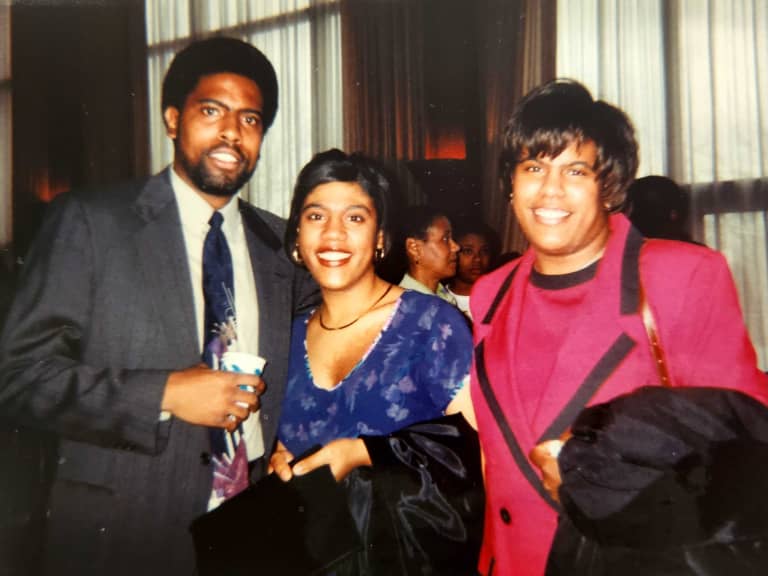
Her first job out of college brought her back to New York City as a real estate researcher. At that time, she first experienced a certain level of discomfort from colleagues of a different race.
The person who made her feel that way appeared oblivious to his actions. "I got braids down in my shoulders. And the next day, I was at the printer, and I specifically remember my boss's boss coming up to me and grabbing (my) hair. Looking back, I'm like, wow, that's a major violation."
Today, an invasion of personal space and unwanted touching are significant violations in the workplace. For various reasons, however, many of these incidents go unreported. That does not mean that the event does not harm the person on the receiving end, which could have been avoided by awareness.
Jovina's career pivot to human resources occurred after working during the internet boom. "We had the free lunches, went to the happy hour, went to bed, got up, and did it all over again. It was great until it wasn't because the money ran out. I interviewed for a research supervisor (role) reporting to the VP of HR... My second interview was scheduled for September 11th, 2001. I really needed a job, so I went in. And, of course, the interview didn't happen. I then interviewed on September 18th, and one of the questions the VP of HR asked was if I would be comfortable learning some HR? I was like, 'Sure. What have I got to lose?'.
Jovina, who admittedly was not a sports enthusiast at the time, found her way to the industry after being laid off during the Great Recession in 2008 when a recruiter insisted she would be a great fit for an opening with the New York Red Bulls. It turns out that being a Penn State graduate was something she had in common with the hiring manager, and that conversation blossomed into a five-year stay with one of the league's flagship clubs.
Johnson continued her career in sports by working with the New York Cosmos. She then shifted to third-party logistics before returning to sports and taking a role at the NBA Players Association.
Jovina confronted situations at the workplace with people from different backgrounds, where she was spoken to, or people behaving differently around her solely based on her appearance. She often questioned why people needed to talk to her in a certain way. "One of the main challenges (I've faced) is the way that people have addressed me as opposed to the way they address other people that don't look like me on my same level, and I've honestly brought it to their attention." Stereotypes in the office continue to be an area of concern for many companies. The lack of sensitivity training often allows that behavior to occur.
Still, Jovina would personally challenge the people who mocked or treated her differently. "Do you notice the tone you take with me?" She would ask them. "The things you say to me versus what you said to another director, you don't address that person that way." Ultimately things would be laughed off because, according to them, Johnson was "cool," and they knew it didn't "bother her," but it did.
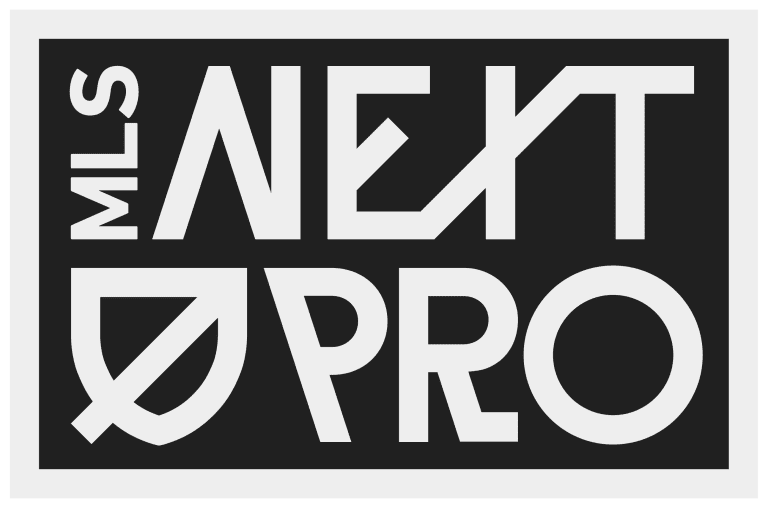
These are the kinds of assumptions that are made regularly in the workplace on any given day.
"Being in a space dominated by people who don't look like me, sometimes has been very frustrating. I'll give you an example. In a meeting, we had this leadership training and had these people come in. We had to go around the room and talk about one thing we liked about somebody and one we felt they could work on, which I hated. I told them that I hated this exercise. The ongoing theme with me was that sometimes I seem unapproachable. They said, "Sometimes you walk down the hall. You don't smile, and you know I don't know what to do,' When another person did the same thing who didn't look like me, they would say to them, "When you get in the zone like that, and you're in the hallway like we know something's going to happen,' I always wondered when that was me in the hallway, why couldn't I be in the zone?"
Life at MLS NEXT Pro
Jovina has experienced a high level of comfort and inclusiveness at MLS NEXT Pro. As the Vice President of HR, she has been fundamental in helping to build the league's team. "Things are very different here. Charles (Altchek, MLS NEXT Pro President) interacts with everybody. He is very consistent in the way he is in public is the way he is in private. So I've seen him address everybody consistently. It is very refreshing. It does help to see Ali (Curtis, SVP Competition and Operations) and Brook (Gardiner, SVP and General Counsel), both black men. They're two-thirds of the senior management team. That's pretty big." In addition to management, Johnson has been told how proud people are to work for MLS NEXT Pro, especially when they look at the Zoom tiles during our team meetings. Diversity is one of the league's four pillars. Jovina feels that the league office team clearly reflects that.
"To see Joe (a Hispanic man), Sarah (a white woman), to see Jason (a Black man), but also to see Patrick (a Spanish speaking white man), to see Constantine (a white man), the diversity does not only physically look different, but it's also different on so many levels. Education, experiences, and just backgrounds. Whether we came from baseball, another club, league, or school. I've noticed it's totally different here. That's what I like."
The league's executive leadership is grateful for Johnson's impact thus far “Jovina’s leadership and guidance has helped shape the culture for our new League Office with folks coming in with different backgrounds, experiences and perspectives,” said Altchek. “She has been an an important voice within our leadership team and I appreciate her contributions thus far and look forward to the future. As we like to remind ourselves, we are just getting started.”
Gardiner added, “Jovina’s experience enriches all of us. Together we are building a culture that lives up to our collective aspirations of inclusiveness and opportunity.”
MLS NEXT Pro's pillars are player development, our local communities, innovation, and a commitment to Diversity, Equity, and Inclusion. The league's success will depend on how organically these pillars unfold.
It's worth mentioning that Jovina's extensive career has allowed her to take on different challenges and develop critical skills. But one thing she said is always top of mind is to try and "take every phone call" regardless of how busy our schedules may be. "I try to meet for every coffee and every meal. I honestly try to look at every resume that comes across my desk because I remember that is what I would have wanted." Ultimately she believes that nothing trumps networking. "I'm going to say this final thing. And then I'm going to be done. But play the game. When somebody brings in the coffee cake, even if you're not going to eat it, grab the coffee cake."

